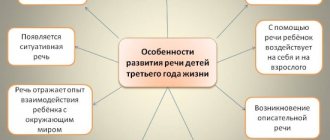For many parents, the day separating the first year of a child’s life from the second is a kind of milestone for summing up the results. They closely analyze the achievements of their children’s peers, comparing them with what their child can do and are worried if they notice a lag behind the norm. Of particular concern is the fact that a child does not speak at one year of age.
Let's figure it out, is it really important to worry if a child hasn't uttered a word in a year? When should you worry about speech delay? What can be done in advance to ensure that a one-year-old baby’s speech corresponds to the norm?
Between normality and pathology
No one needs to prove the importance of timely mastery of their native speech. This is a complex, multifaceted process directly related to various mental functions: attention, thinking, memory and speech. They expect the first words from a one-year-old baby, but he cannot even say “dad” and “mama”, he babbles in his own language and is not going to learn new words.
Alarmed parents begin to study family history, turn to doctors for advice and do their best to speed up the speech development of the baby.
A one-year-old child is able to pronounce from 3 to 12 words, but in their structure they are simple, very similar to babbling. Woof-woof, beep-bee, am-am, lalya, give, dad, mom, baba, kitty, na, bang or whoop - this is the approximate vocabulary of children per year.
Each baby is individual - some develop their first word at 8–9 months, and others at 1 year 3 months, and all these are variations of the norm.
Before the appearance of the first word, the speech of a one-year-old child went through a complex path of development. The laws of the formation of children's speech do not change over time. Today, like 100–200 years ago, not a single baby begins to speak in words and sentences until he has gone through all the stages of speech development. These stages are associated with the development of the brain, articulation apparatus and hearing.
No early development method can change the laws of nature, according to which the organs of pronunciation (articulation), hearing and the central nervous system of a person develop.
If you are concerned that your baby speaks poorly, check out the main stages of pre-language development in children under one year of age:
- 1–2 months – the appearance of intonations of pleasure and displeasure in the cry;
- 1.5–3 months – humming or hooting, when children repeat after adults vowels with the sound [g] or pronounce them independently, carefully listening to the sounds they pronounce (agu);
- 4–5 months – babbling, pronunciation of similar words consisting of several identical syllables (ma-ma-ma, but this does not yet mean the word mom);
- 8–9 months – appearance of onomatopoeia (pee-pee, woof-woof) and babbling words (kuka, tata, nanny);
- 11 months – the child uses approximately ten babbling words in the correct context, correlating their pronunciation with the situation (mom, dad, dai, bibi, etc.).
What is considered pathology? It is still too early to make predictions about speech development at one year old, however, you should start to worry if a one-year-old baby does not understand simple verbal instructions that are not supported by gestures. For example, “Give me the ball”, “Show me where the car is”, etc. Lack of response to an adult's words may be a symptom of hearing impairment or its complete absence. In this case, speech stops at the humming stage, because the child has nothing to relate his own babble to.
If urgent measures are not taken at this stage, it will be very difficult to stimulate speech development in the future. It is important to promptly contact an otolaryngologist for a hearing test. Perhaps, in case of pathologies of the inner ear, the doctor will consider it necessary for the child to wear a hearing aid. In case of serious hearing deviations from the norm, this is the only opportunity to develop and maintain speech.
What to do if a child does not understand speech?
At the “BEFORE” correction stage of the tertiary cortex (that is, with auditory speech agnosia), Tomatis is ideal for helping. This can be seen both in practice (the understanding of speech in children who did not even respond to their name is amazingly improved) and in the study of evoked potentials. Of course, auditory stimulation must be combined with speech therapy sessions, but even without them there is always a huge leap in speech perception.
And at the level of the tertiary cortex (when auditory speech gnosis is well formed), the help of a speech therapist is necessary for the development of language, the acquisition of polysemy of words, and the elimination of agrammatisms. And classes need to be taken regularly and for a long time.
By the way, the understanding of speech deficits that is closer to me is not discrete (there is speech, there is no speech, hence the term “alalia”, that is, absence of speech), but a continuous one, because even after the start of speech, the child continues to master the language system (that’s why I really like the term “dysphasia development").
Neuropsychologist Alexandrova O.A.
Child doesn't speak? Doesn't understand speech? Sign up for a consultation by phone or fill out the form on the website.
Possible reasons for delayed speech appearance per year
If the baby is completely healthy, there is no history of neurological diseases, but speech has not appeared at one year, most likely the reason for the delay is in an improperly organized speech environment.
What is meant by this term? It would seem that modern children are surrounded by a real stream of speech: TV, radio, cartoons, audio books and educational games for the youngest children. And parents talk a lot with their children.
The fact is that young children are not able to isolate individual words from a stream of speech. If no special purposeful work is carried out, this flow for a child sounds approximately the same as the sound of a waterfall sounds for us.
Today, speech games (Magpie-Crow, Ladushki), nursery rhymes, pestushki, songs, sayings, previously known in every family, have disappeared from everyday life. These unique simulators gently introduced the baby into the world of native speech. They were adapted to the needs of a child up to one year old, contained onomatopoeia, and were understandable to children.
Another factor in the “nutrient” environment for the development of children’s speech is communication with the mother. A silent mother or a mother who talks on the phone more often than with her own baby will not be able to replace the value of communication, which forms the speech structures of the brain, with the best educational games.
“Mowgli’s children”, “hospitalism” - all these terms denote a delay in the appearance of speech in healthy children who are deprived of the opportunity to communicate with loved ones due to their absence.
When should you sound the alarm?
You should really worry if:
- the child does not show interest in the world around him;
- he does not recognize mom and dad, family members living with him;
- there are severe hereditary pathologies in the family;
- the baby does not know his name, does not respond to speech and sounds;
- his fine and gross motor skills are not developed, for example, he cannot pick up a toy;
- the child does not respond to adult speech and does not fulfill simple requests;
- There are risk factors - difficult childbirth, difficult pregnancy, central nervous system pathologies, hearing and vision impairment.
Experts identify the following reasons for the lack of speech at one year of age.
- Difficult pregnancy, difficult childbirth, intrauterine infections, maternal use of certain medications, alcohol, illegal substances - all this can cause disturbances in the functioning of the central nervous system.
- Pathologies of hearing and vision - if the child does not see or hear the world around him, it is difficult to expect any response.
- Pacifier obsession: If the mouth is constantly busy, the baby will communicate with parents using gestures and mooing. There is simply no need for articulate speech.
- Pedagogical neglect: a child should be taught to speak from the first days of life, so that he knows how speech is created and sounds.
- The other extreme is the baby’s overload. Many parents begin to work intensively with their child from birth and literally demand his first words. Silence in this case is an expression of protest.
- If several languages are used in the family at the same time, then the child needs some time to figure out which one he should learn to speak.
Psycho-emotional development of a child at 6 months
Watching how a baby’s psyche develops is especially fascinating. A six-month-old child shows emotions: he may frown or laugh, and tries to copy the facial expressions of adults. He begins to understand the emotions of his parents and reacts to them according to the situation, and his own voice changes in intonation depending on his needs and mood. The kid is aware of cause-and-effect relationships: if you hit the bell, it will ring. A six-month-old child recognizes his parents and joyfully reaches out to them, but strangers often frighten and confuse him, keep this in mind. The baby recognizes his name, the names of some familiar objects, and can look or point at them if he names this object. At this age, it is a completely normal part of development to put everything in the mouth, including your own feet and toys. The child becomes very tactile, he is interested in the differences between the textures of the surfaces of objects, so it is recommended to have different toys: smooth, rough, fluffy.
How to create a favorable speech environment at home
Play audio recordings with children's jokes. Limit your time in front of the TV. The development of speech skills is facilitated by maintaining a dialogue with the baby; write stories together. You will be a role model for him, your facial expressions, gestures, intonation. Gradually replace incomplete words with correct and adult ones. First repeat the syllables, then use sentences.
By putting your child in front of a modern gadget, you will only harm your child. It will be useful and interesting to visit the zoo with him, where he will get to know the animals. This will certainly cause a storm of emotions. If your baby is lazy to talk, motivate him to do so. For example, he asks with a gesture or the word “Give” a toy, ask what it is, what it’s called or what it does.
Don't overload your baby. At this age, his concentration will not last long, maximum 10-15 minutes. Give preference not to fashionable methods, but to what he likes. This can only be determined experimentally.
How to stir up little silent ones
If a child does not say “mom” or “dad” in a year, perhaps speaks only syllables or simply hums, the first step is to rule out the cause of poor health.
A comprehensive medical examination by specialized specialists in this case will not be superfluous. It will allow you to assess the overall development of your baby and begin treatment in a timely manner, if necessary.
When this reason is excluded, tune in to simple actions and successful results:
- More communication. When talking to a child, try to speak measuredly, clearly, and correctly. Let him see how you pronounce words, hear the different intonations of your voice. Talk about everything. What are you doing at the moment, what are you feeling, what is happening around you. Invite your baby into a dialogue by asking questions, even if you have to answer them yourself. This is what a creative process is like.
- Make friends with a book. Reading fairy tales, poems, nursery rhymes, looking at bright illustrations, sounding them with onomatopoeia (beep car, kitty meow, crow caw caw) is an interesting activity for everyone who participates in it. Involve your child in the process, who will gladly tell you with his finger where the wolf is and where the bear is, if you don’t know it yourself.
- Practice games to develop fine motor skills. By training your fingers, you can significantly speed up the development of speech - this is a well-known fact. For this purpose, finger games and other games that develop small muscles of the hands are widely used. It is also important that when playing, for example, magpie-crow, the child receives his mother’s affectionate touches and a warm smile, opening up emotionally in response. And by screwing the lids, sorting out the cereal, attaching clothespins, threading laces, assembling pyramids, he learns patience, hard work, and concentration. This is how the development process proceeds comprehensively and broadly.
- Do articulation exercises together. To get your speech muscles in working order, it is useful to do a special warm-up for your lips, cheeks, and tongue. Articulation exercises can be very simple. For example, show your child how a frog smiles, a tiger growls, a wolf licks its lips, a hippopotamus opens its mouth, and what kind of trunk an elephant has. If you want, you can just make a face, it’s even more fun.
- Be in nature. Take every opportunity to be in nature with your child. This could be a city square, a park, or a suburban area. Allow him to explore the world around him. Let him touch the tree trunk and feel the roughness of the bark; listen to the birds screaming in many voices; look at how ants work to build their house; hold a cone, acorn or chestnut in his hands. Emotional development stimulates speech, this should not be neglected.
Is there any cause for concern?
So, your child is one year old, but he speaks little and poorly? Assess your baby's general condition:
- what is his reaction to the noise of household appliances, people’s voices;
- does he respond when addressed;
- does he react visually to what is happening around him?
- are there any disturbances in coordination of movements;
- how the fingers work when performing precise small movements;
- what is his emotional state?
Concern about the fact that a child does not speak a word at one year is justified if there is a general delay in psychomotor development. This may be due to organic disorders of brain activity.
Features of the development of girls at 6 months
Physiologically, girls develop a little faster than boys, so at six months they are somewhat more likely to be able to sit up and crawl. True, it’s still not worth putting the baby out if she can’t sit down herself. In terms of other differences, girls may be slightly smaller and lighter than boys. This is how sexual dimorphism begins to appear in childhood. The WHO norm for a girl's height is 61.2-70.3 cm, for weight - from 5.7 to 9.3 kg.
Speech disorders
Incorrect articulation can be considered normal in children under 2-3 years of age. If speech defects are persistent, speech therapy intervention is required. In case of pronounced pronunciation disorders, the presence of a severe speech disorder should be excluded.
Parents should not make a diagnosis on their own, but it is important to know about the most common pronunciation disorders in order to seek help from a speech pathologist in time and quickly cope with the disorder. If the defect becomes persistent, it will be more difficult to eliminate it. In speech therapy, it is customary to classify speech disorders into 4 types:
- incorrect articulation;
- pathologies of rhythm and tempo of pronunciation;
- defects caused by hearing problems;
- GSD (general speech underdevelopment) or loss of existing skills.
Defects caused by hearing problems
Even a slight decrease in hearing acuity negatively affects articulation. If a small child has hearing loss, speech development is impossible. Children who were born deaf and lost their hearing before the age of 3 will remain mute without special training. At the same time, the speech apparatus is not damaged, and intelligence is within normal limits.
Decreased or absent hearing is not related to mental abilities. Many children can attend regular schools. But for this you need to contact a speech therapist as early as possible and begin correction.







